The ISOH lifetime award has been presented annually since 2005. Individuals who have dedicated their life’s work to researching, communicating and/or disseminating Olympic history through publications in print or digitally, documentations, exhibitions etc. are honoured on an annual basis. The ISOH lifetime award is the most recognized award for Olympic history inside the Olympic Movement.
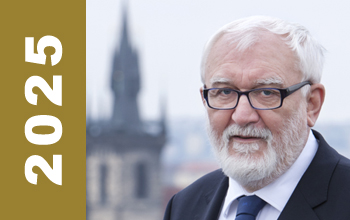 FRANTIŠEK KOLÁŘ (* 1952)
FRANTIŠEK KOLÁŘ (* 1952)
CZECH REPUBLIC
František Kolář, born April 9, 1952, is a Czech historian and Olympic studies expert from Prague, ISOH member since 2003. A graduate of Charles University, he earned his Candidate of Sciences in 1985 and studied in Paris at Sorbonne and EHESS. His teaching has included Olympic history, modern Czech politics, and sport history. Kolář’s research focuses on Czech and international Olympic movements, Coubertin, and Jiří Stanislav Guth-Jarkovský. He authored major works such as Jiří Stanislav Guth-Jarkovský (2011) and Český olympismus – 100 let (1999). His scholarship brought international recognition to Czech Olympism, making him a worthy recipient of the ISOH Lifetime Achievement Award 2025.
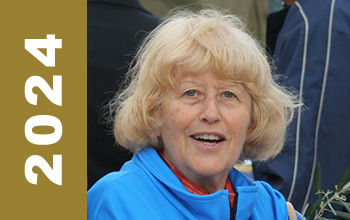 INGRID O’NEIL (* 1942)
INGRID O’NEIL (* 1942)
UNITED STATES OF AMERICA
Ingrid O’Neil is one of the world’s most credible references around Olympic memorabilia. In the Olympic world, she is a well-known and respected name among collectors, sports museum professionals, curators, and researchers. In the field of Museology, objects are important for safeguarding cultural heritage. Objects contain stories. Historical objects and documents can help ensure that history is not lost. The responsibility of placing an object or document on the market is crucial, especially for collectors and curators. Born in Germany, she migrated to the United States in the 1970s. From 1990, she began conducting auctions of Olympic Games memorabilia. She hosted the 95th auction in 2023. You may listen to an interview with 2024 Lifetime Award winner, Ingrid O’Neil here.
 INGOMAR WEILER (1938-2023)
INGOMAR WEILER (1938-2023)
AUSTRIA
Ingomar Weiler, was born 28 April 1938 in Treglwang, Styria. In his research, Weiler combines sport with the thematic complex of ancient history. This focus includes above all the problems surrounding the origins of sport, criticism of the Olympics, spectator behaviour as well as didactic tasks. Ingomar Weiler has researched and disseminated ancient sports history like no other over the last 50 years and, above all, brought it closer to a broad audience in the sports world. He has been teaching at the IOA for many decades and has popularised ancient sports history by lecturing tirelessly and for hours at Olympia and other excavation sites on the nature of the agon. Unlike many other colleagues in his field, Ingomar Weiler has always sought and found interdisciplinary contact outside of ancient studies with sports science.
Watch Ingomar Weilers laudation
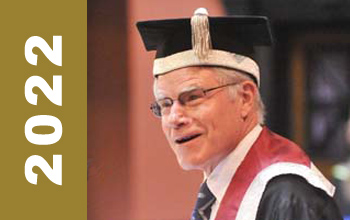 BRUCE KIDD (*1943)
BRUCE KIDD (*1943)
CANADA
Ever since he competed in the 1964 Olympics in Tokyo and wrote a twice-weekly syndicated column about those games for Canadian student newspapers, Bruce Kidd has been writing critically, supportively and comprehensively about the modern Olympic Movement. As chair of the Olympic Academy of Canada between 1983 and 1993, he sought to educate up-and-coming Canadian sports leaders in what he called ‘the aspirations of Olympism’, and challenged them to make their full realization, especially the Coubertin call to make sports a vehicle for respectful intercultural education and exchange, the basis for their leadership. He continues to assert the breadth of the Olympics’ humanitarian project and the importance of critical contemporary and historical research in his writing, teaching and media interventions. Watch Bruce Kidd presentation
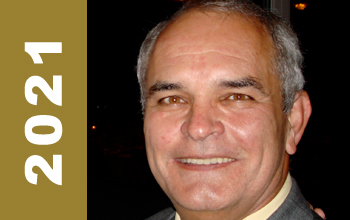 BILL (WILLIAM) MALLON (*1952)
BILL (WILLIAM) MALLON (*1952)
UNITED STATES OF AMERICA
Along with Ture Widlund, Bill Mallon was the driving force behind the creation of the International Society of Olympic Historians (ISOH). He was one of seven historians present at the founding meeting in London on 5 December 1991, and the first editor of what became the Journal of Olympic History. He served as ISOH president from 2000 to 2004. Mallon was also the key figure in establishing the various awards presented by ISOH from 2005. After decades of work, and in collaboration with many Olympic historians, he developed the ‘Olympedia’ database, which was ultimately sponsored by the International Olympic Committee. In 2020, Olympedia became an open access site.
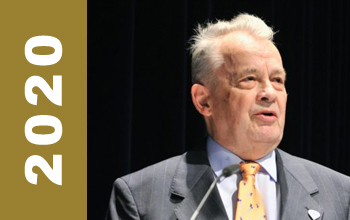 WALTHER TRÖGER (1929-2020)
WALTHER TRÖGER (1929-2020)
GERMANY
Walther Tröger was a stalwart of the Olympic movement for decades. He served as President of the National Olympic Committee for Germany,was Sports Director and a long-serving member of the IOC and Chef de Mission to the German team at eight Winter Games. He was not only a participant but an active figure in shaping the Olympic family. He was the driving force behind the development and operation of the German Olympic Sports Museum in Cologne and was a keeper of Olympic values and history. He also collected written material, memorabilia and objects in order to preserve Olympic heritage for posterity. His extensive and unique collection is being preserved and organised and bears witness to an extraordinary life as a living figure of Olympic history.
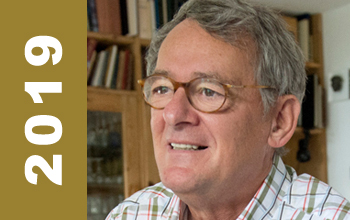 NORBERT MÜLLER (1946-2022)
NORBERT MÜLLER (1946-2022)
GERMANY
With more than 100 publications, Prof. Dr. Norbert Müller was one of the renowned and internationally recognised Olympic historians. He led the way in academic research on Coubertin by making his writings accessible in various languages. His occupations were both research and, above all, the dissemination of Olympic knowledge. He did this with great intensity together with his students at the University of Mainz, but also at the International Olympic Academy in Olympia, with which he was connected since the 1960s. Müller organised exhibitions, excavations and sought to disseminate Olympic ideals through the media. He was a historian, researcher and educator on Olympic topics and could be seen as a kind of polymath in the Olympic movement.
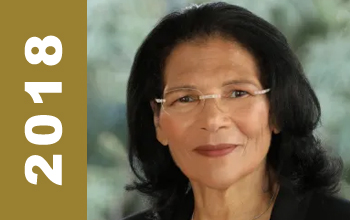 ANITA DEFRANTZ (*1952)
ANITA DEFRANTZ (*1952)
UNITED STATES OF AMERICA
Anita DeFrantz, was captain of the U.S. rowing eight which won Olympic bronze in 1976. When American President Jimmy Carter ordered a boycott of the 1980 Moscow Games, DeFrantz filed a lawsuit against the United States Olympic Committee on behalf of 25 athletes in the US. DeFrantz became president of the LA84 Foundation, and during her tenure, it supported a coaching programme which has benefited more than 750,000 participants. A further 500,000 young people took part in a swimming programme under the aegis of the foundation. LA84 has given financial aid to 1,000 organisations, helping an estimated 3 million children. De Frantz was co-opted as a member of the International Olympic Committee (IOC) in 1986 and served twice as vice-president.
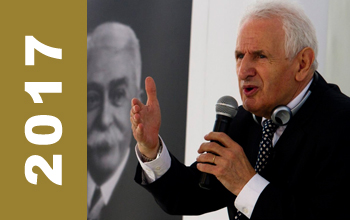 JEAN DURRY (*1936)
JEAN DURRY (*1936)
FRANCE
In 1963, Durry was chosen by the French Ministry of Youth and Sport to establish the French National Sports Museum. He remained as the Museum’s director until 2001. Durry collected for the Museum more than 100,000 documents going back to the 16th century, as well as 17,000 posters. From 1970 onwards, he produced 55 episodes for the radio series “Sport and Man.” Durry was president of the International Federation of Sports Films and Videos from 1987 to 1991. He was also secretary general of the International Fair Play Committee from 2005 until 2013.
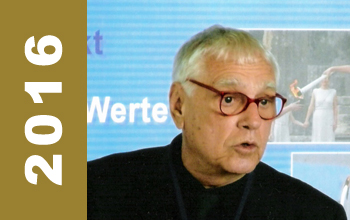 LAMARTINE DACOSTA (*1938)
LAMARTINE DACOSTA (*1938)
BRAZIL
His publications made Da Costa a pioneer in bringing knowledge of sports history to Brazil. He also encouraged other Brazilian scholars to achieve international visibility. He became the Brazilian face of Olympic studies internationally and was one of the first Brazilian lecturers invited to the International Olympic Academy back in 1991. He opened the doors for Brazilian scholars to participate in the Olympic world by making their own contributions. In 1998 he founded the Brazilian Olympic Academy and was its first president. As the first Brazilian member of the Comité International Pierre de Coubertin, he played an important role in establishing a national committee in 2006. A year earlier he had published his “Atlas do Esporte no Brasil” which can be regarded as the masterpiece of his scientific career.
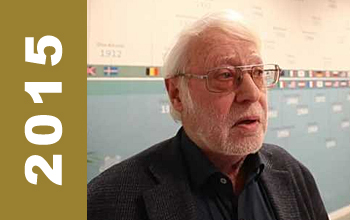 ROLAND RENSON (*1943)
ROLAND RENSON (*1943)
BELGIUM
He began as a student at the Institute Physical Education of the Catholic University Leuven and later became professor at the same institute. He was initiator and chairman of the Central Flemish Folk Games and of the ‘Sports Museum Flanders’, which in 2008 became “Sportimonium”. From 1985 to 1989, he was president of the International Association for the History of Physical Education (HISPA); later of its successor the International Society for the History of Physical Education and Sport (ISHPES) from 1989 to 1993. He particularly focused on the history of the 1920 Olympic Games in Antwerp and research about Flemish Folk Sports.
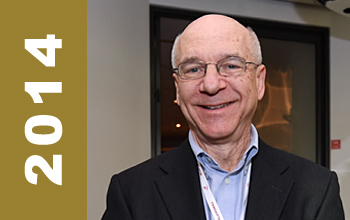 WAYNE WILSON (*1950)
WAYNE WILSON (*1950)
UNITED STATES OF AMERICA
In 1987, Wilson accepted a position with the LA84 Foundation (then known as the Amateur Athletic Foundation of Los Angeles), which had been funded by the profits from the 1984 Los Angeles Olympic Games. He played a crucial role in establishing the Foundation’s sports library. Under Wilson’s direction, it added 120,000 sports-related articles, monographs, books and other documents, including the Official Reports of every Olympic Games, Summer and Winter. These were made available on the LA84 Foundation website. Wilson ensured that this material was fully searchable which makes the project even more valuable.
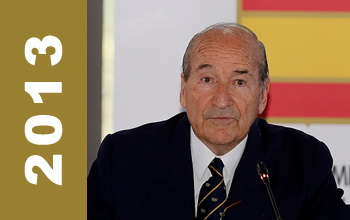 CONRADO DURÁNTEZ (*1935)
CONRADO DURÁNTEZ (*1935)
SPAIN
He has dedicated his life to the dissemination of Olympic Values. Since his participation in the first session of the International Olympic Academy in 1961, he has been a pioneer in the field of Olympic Education creating and helping advance many of the currently existing entities in the space. He has made a great impact globally but especially in Spanish and Portuguese speaking countries where he puts an additional focus. He initiated the concept of National Olympic Academies creating the first of its kind, the Spanish Olympic Academy, in 1968 and he helped found numerous others across the world. He also created the first confederation of Olympic Academies (Asociación Panibérica). He was president of the International Committee Pierre de Coubertin from 1990 to 2001. He has always been happy to share his vast knowledge on the Olympics, in particular his work on the Ancient Games and on Pierre De Coubertin. He has written over 50 books on numerous Olympic topics.
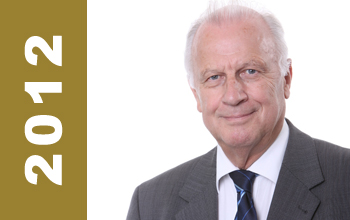 MANFRED LÄMMER (*1943)
MANFRED LÄMMER (*1943)
GERMANY
Lämmer is a certified sports instructor and classical philologist. He was appointed professor at the German Sport University Cologne in 1975, where he served as head of the Institute for Sport History for many years. His research interests include the history of gymnastics and athletics in antiquity and their influence on modern sports. He was the founder of the German “Sport & Olympia” Museum and co-founder of the European Fair Play Movement. From 1972 to 2004 he served as Secretary-General, President and Vice-President of the International Society for the History of Physical Education and Sports (HISPA),known today as ISHPES. He is President of the European Olympic Academies (EOA), Deputy Chairman of the German Olympic Academy (DOA) and co-editor of the journal “Stadion”.
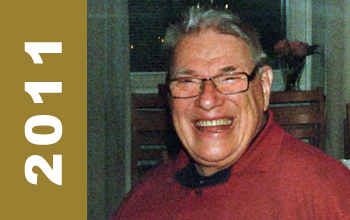 OVE KARLSSON (1944-2021)
OVE KARLSSON (1944-2021)
SWEDEN
ISOH founder member and Executive Committee member from 2004 to 2008, Karlsson was a sports journalist who enjoyed a career of over 40 years in papers and news agencies. He also served on the International Sports Journalists Association (AIPS) Committee for eight years from 1973. He was Sweden’s press attache at the 1980 Moscow Olympics, and for many years produced the authoritative “Olympiaboken” after each Olympic Games. A prolific researcher and record keeper, he documented accurate biographical details and obituaries for Olympic medallists of all countries for our journal. He also uncovered many aspects of Swedish Olympic history for a wider audience and became founding president of the Swedish society for ice hockey historians. He supplemented his own meticulous archive with files compiled by distinguished contemporaries Erich Kamper, Ture Widlund and Wolf Lyberg, preserving this material for future generations.
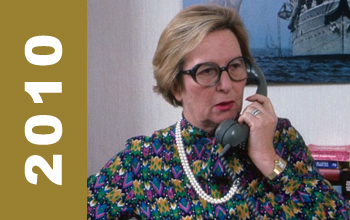 MONIQUE BERLIOUX (1923-2015)
MONIQUE BERLIOUX (1923-2015)
FRANCE
Berlioux (1923-2015) started as a journalist and sports reporter. In 1961, she was appointed chief of the press department of the Cabinet of the French State Secretary for Youth and Sport. In 1967, she became IOC Director of Press and Public Relations and took over as Head of the Administration in 1969. From 1971 to 1985, she served as IOC Director of the IOC. After leaving the IOC, she worked as technical advisor for the Mayor of Paris from 1985 to 1996 and was an important figure in the city’s bid for the 1992 Olympic Games. In 1996, she received the Chevalier de la Légion d’Honneur. In her younger days, she had been a successful swimmer who won 40 national titles. In 1948, she competed at the London Olympic Games in the 100 m backstroke.
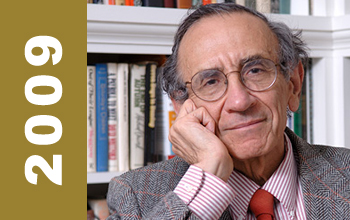 ALLEN GUTTMANN (*1932)
ALLEN GUTTMANN (*1932)
UNITED STATES OF AMERICA
Guttmann was born in 1932 in Chicago and grew up in a Catholic working-class neighbourhood. He became a professor of English and American studies at Amherst College in Massachusetts. His research focus is the history of sports and his most famous book From Ritual To Record has been translated into several languages. His theories on the origins of modern sport were and are not without controversy and still animate a discussion on the subject today. Guttmann was also one of the first to deal with the history of women’s sport. He also authored an acclaimed biography of the IOC President Avery Brundage.
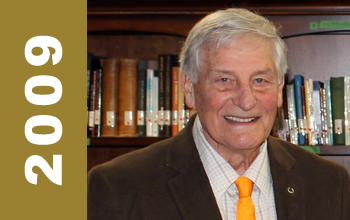 BOB BARNEY (*1932)
BOB BARNEY (*1932)
CANADA
Barney was a professor at the Western University in London, Ontario, Canada. His academic field of research spans the history of the Modern Olympic Games,the development of Olympic Commercialism and Canadian ‘nation-building’ through the Olympic Games. He is not a researcher in a quiet closet, but has always been interested in discussing the history of sport with others and bringing it into the public consciousness. He has organised dozens of congresses and conferences and is involved in sports organisations and as an editor of journals on sports history.
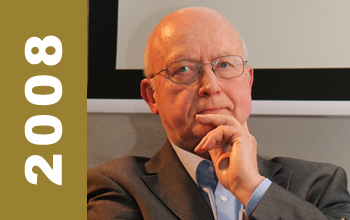 VOLKER KLUGE (*1944)
VOLKER KLUGE (*1944)
GERMANY
Volker Kluge is a German journalist who has worked for 40 years for daily newspapers and journals. Since 1968 he has published more than 50 books, documentaries, DVDs, as well as thousands of articles on sports, the Olympic Movement and Olympic history. He has also been the curator of exhibitions. So far, he has reported on 18 Olympic Games. He was a member of the Executive Committee and Honorary Press Chief of the NOC of the GDR, and afterwards a personal member of the NOC for Germany. Since 2012 he has been the editor of the Journal of Olympic History.
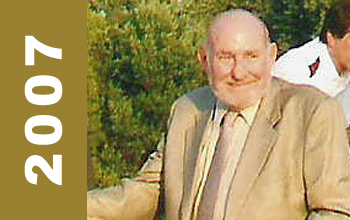 DAVID YOUNG (1937-2013)
DAVID YOUNG (1937-2013)
UNITED STATES OF AMERICA
A classics professor, David C. Young was the author of The Olympic Myth of Greek Amateur Athletics, The Modern Olympics: A Struggle for Revival and A Brief History of the Olympic Games. His published articles included “Croton and the Games”, “Professionalism in Archaic and Greek Athletics,” “Dimitrios Vikelas and Pierre de Coubertin: A Partnership of Destiny” and, for the Journal of Olympic History, “That Memorable First Marathon,” which he co-authored with Tony Bijkerk.
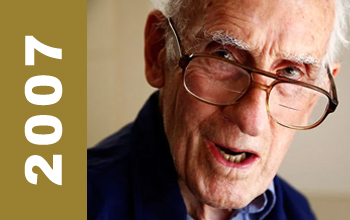 JOHN LUCAS (1927-2012)
JOHN LUCAS (1927-2012)
UNITED STATES OF AMERICA
John Lucas taught a course on the “History, Philosophy, and Politics of the Modern Olympic Games” for over 30 years at Pennsylvania State University. He made a point of running 10,000 metres on the Olympic track at every Summer Olympics between 1960 and 2008, although in both 1980 and 2008 he was permitted only to do so around the stadium. Among his articles for the Journal of Olympic History are “The Great Gathering of Sport Scientists: The 1904 St. Louis Olympic Games Exposition Fair Physical Education Lectures,” “The Death and Burial of Coubertin: A Retrospective” and “Avery Brundage and his Vision of the Olympic Games during the Unsettling years 1938-1952.”
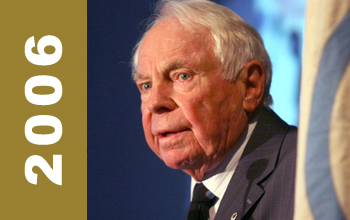 HARRY GORDON (1925-2015)
HARRY GORDON (1925-2015)
AUSTRALIA
A highly respected Australian newspaperman who covered the Korean War, he later forged a reputation as an authoritative chronicler of Australian Olympic history. He first reported the 1952 Olympics, beginning a 60-year association in which he advised on media arrangements for Melbourne 1956 and took great pride in their return to Australia for Sydney 2000. Gordon’s journalistic instincts successfully discovered the identity of hitherto anonymous John Ian Wing who suggested teams should enter the Olympic Closing Ceremony without distinction of nationality. Gordon worked with Dawn Fraser on her autobiography and the invitation of Australian Olympic Committee (AOC) President John Coates, he wrote “Australia and the Olympic Games,” published in 1994, which set a benchmark for others to follow. His last book “From Athens with Pride” was equally acclaimed. Gordon received the Olympic Order in 2001 and was inducted into Australian sport’s Hall of Fame.
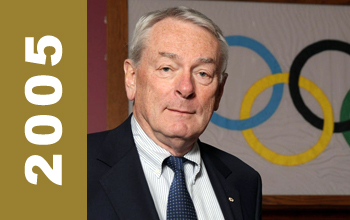 DICK POUND (*1942)
DICK POUND (*1942)
CANADA
Dick Pound represented Canada in swimming at the 1960 Olympics. He was secretary of the Canadian Olympic Committee and in 1977, he became its president, remaining in office for eight years. Pound joined the International Olympic Committee (IOC) in 1978, served on its executive board for 18 years and was twice vice-president. He was chairman of five different IOC commissions and is set to become an honorary member this year. When ISOH was recognised by the IOC, Pound was appointed the IOC’s representative to our executive board and has continued to serve in this position for 25 years. He was co-founder and chairman of the World Anti-Doping Agency (WADA).
